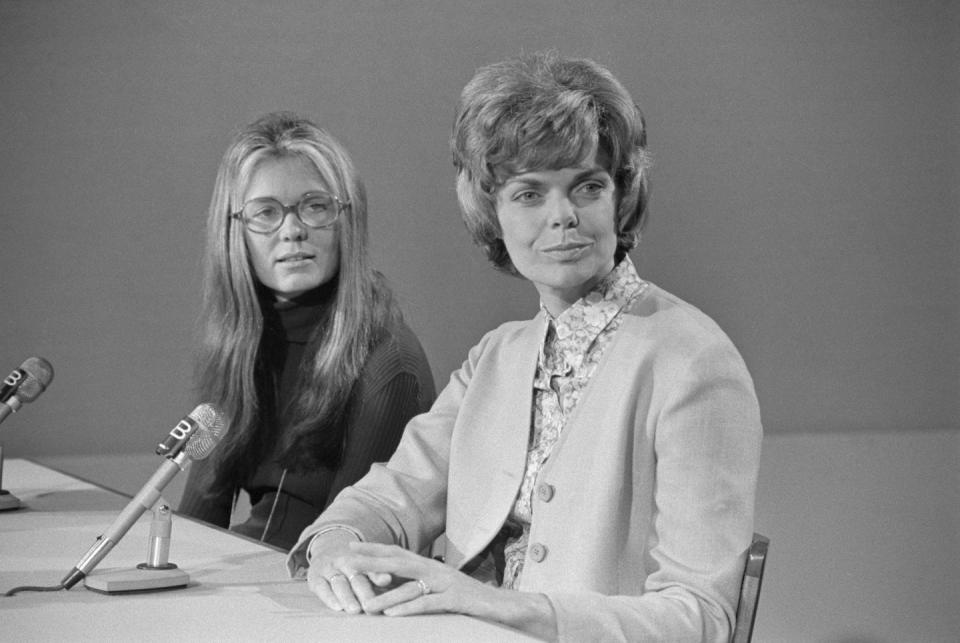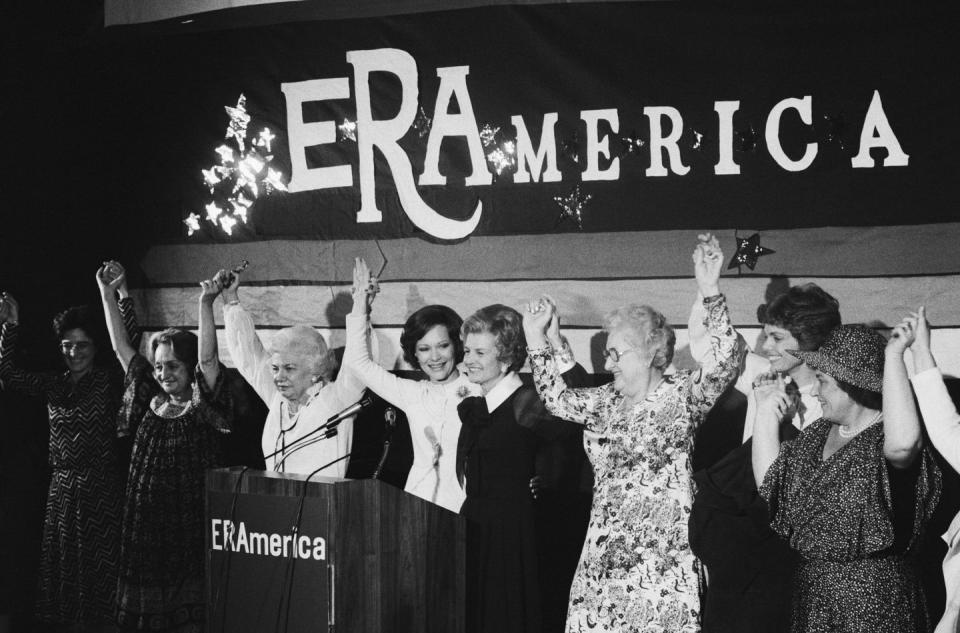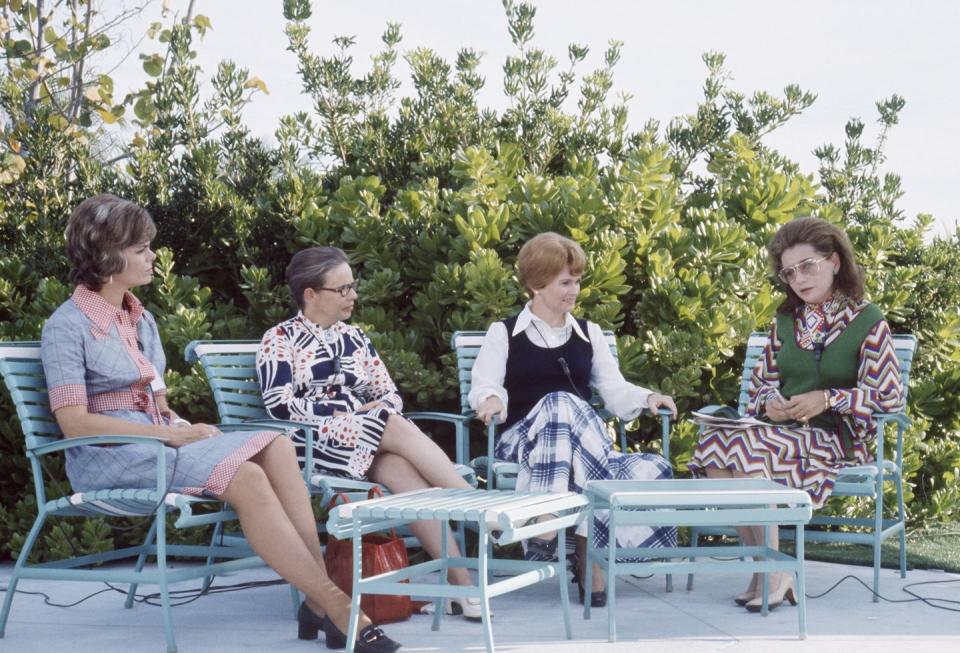Who Is Jill Ruckelshaus, the Republican Feminist Played by Elizabeth Banks in 'Mrs. America'?
In the sixth episode of Hulu's new miniseries Mrs. America, simply titled “Jill,” pro-choice Republican activist Jill Ruckleshaus sits down to have a drink with Phyllis Schlafly, the famed conservative who led the fight to stop the ratification of the Equal Rights Amendment. After a contentious conversation, one in which Schlafly suggests that women being harassed in the workplace are inviting it, Ruckleshaus gets up to walk away. But before leaving, she offers one final retort, summing up so much of what the series has to say about Schlafly’s rise to power: “You want to get ahead climbing on the shoulders of men, Phyllis? Fine. Just know, they’re looking right up your skirt.”
As one of the founders of the National Women's Political Caucus, Ruckelshaus (played by Elizabeth Banks) cemented her place in the fight for women's equality alongside icons like Gloria Steinem, Shirley Chisholm, and Bella Abzug. And now with Mrs. America, she’s being introduced to a new generation of feminists.
But who is Ruckelshaus really, and did the show offer up a fair portrayal? Here, a look back at her long career, her famous family, and her legacy.

Her Background
Ruckelshaus grew up in Indiana, first attending Indiana University for undergrad and Harvard for her master’s in English literature. According to a People profile from 1976, Ruckelshaus was first a "driven homemaker" with an obsession "to be the best housecleaner, to have the best parties, and to have the cleanest, best-dressed children." (She said in a 2005 C-Span interview she doesn't mind being called a homemaker but doesn't think she would have used that term about herself now.) People reported that when she came to Washington D.C. in 1969, she had a "lovely family" but found herself "terribly unhappy."
"I didn’t identify what was wrong with my feelings until I began meeting women who were doing things and were using their minds," she said.
Her Feminist Career
In a New York Times report from August 1973, Ruckelshaus, described as a White House consultant and feminist activist, spoke about the first time she recognized gender discrimination in her own life: "It occurred to me when I was 13 and wearing white gloves and Mary Janes and going to dancing school, that no one should have to dance backward all their lives."
Sticking to that sentiment, Ruckleshaus worked on the advancement of women's rights under multiple U.S. presidents. From 1973 to 1974, she was in the office of presidential counselor Anne Armstrong working as a liaison for women’s issues and resigned in 1974 as the head of the White House Office of Women’s Programs. In 1975, President Gerald Ford designated Ruckelshaus to chair the National Commission on the Observance of International Women's Year, and Ruckelshaus traveled as a delegate to the U.N. Conference on the International Women's Year.

Then in 1980, President Jimmy Carter appointed Ruckleshaus to the U.S. Civil Rights Commission. Though President Ronald Reagan had plans to replace her in the role, the New York Times reported he decided against it. During a 2005 interview with C-Span, Ruckleshaus said she believes the reason Reagan wanted her gone was because she might not have been "Republican enough" for the commission.
“I disagreed with some of the social policies during the Reagan administration," she said. "I didn't think there was enough emphasis on civil rights issues, black and white disparities. The Civil Rights Commission had historically always been aimed in that direction, and during the time I served, the majority party, then the Republicans, the presidential party, was the majority in the Civil Rights Commission, and we weren't doing what I thought we ought to be doing, which was addressing those issues.”
Just like in Mrs. America, Ruckelshaus was a moderate Republican (she once referred to herself as a “Ruckelshaus Republican”) and led an ultimately successful campaign for women’s rights to be included in the 1972 Republican platform. But as the party distanced itself from supporting the ERA, Ruckelshaus fought back. In July 1980, she led a march of 4,500 ERA supporters past the site of the Republican National Convention in Detroit to protest the party not supporting the amendment. At the end of the march, she said: "My party has endorsed the Equal Rights Amendment for 40 years. Dwight Eisenhower endorsed ERA. Richard Nixon endorsed ERA. Gerald Ford endorsed the ERA. But something happened in Detroit last week. Give me back my party."

She also said of the Reagan administration: "I don't think that they have made women's issues a priority. And I sometimes wonder if they understand the issues. I'm not talking about how much money is being spent on programs…I'd like to see more enforcement of Title IX. I'd like to see a vigorous commitment to affirmative action."
At the National Women’s Political Caucus Gala Party in 1991, as the NWPC marked its 20th anniversary, Ruckelshaus reflected on the work of the women’s movement, telling the crowd: “We’ve shown people what the power of women, united over one transcendent idea, can be. That yes, we can put aside partisan differences. We can put aside the things that would divide a political party into a thousand different factions.”
As of 2005, Ruckelshaus was on the board of Costco, as well as the board of the Oregon Shakespeare Festival and the board of trustees at Lakeside School in Seattle.
Her Famous Family
Like the miniseries portrays, Ruckelshaus's husband also had a famous political career. William Ruckelshaus was the very first Environmental Protection Agency administrator and later served as the acting director of the FBI, as well as the deputy attorney general under President Richard Nixon. He's widely known for his part in the “Saturday Night Massacre,” named as such because he and the attorney general both quit their jobs instead of following Nixon's order to fire the special prosecutor who was investigating the Watergate scandal. William went on to be the EPA administrator again from 1983 to 1985, and in 2015, President Barack Obama awarded him the Presidential Medal of Freedom.
The Washington Post has reported that Ruckelshaus was called the "Gloria Steinem of the Republican Party" and that her pro-choice position was part of the reason her husband did not join Gerald Ford's ticket as the vice presidential nominee, as shown in the miniseries.
And just as Ruckelshaus says in the sixth episode of Mrs. America, her husband did actually once say, "In this country we educate men and women up to a level precisely equal, but then send men off to do interesting things and send women off to do things that aren’t very interesting. That’s always struck me as very wrong."
When the two met, William was a widow with two children. The pair went on to have three more children, and their daughter Mary Ruckelshaus also worked for the EPA as the chief scientist. William died in November 2019 at the age of 87.
You Might Also Like

